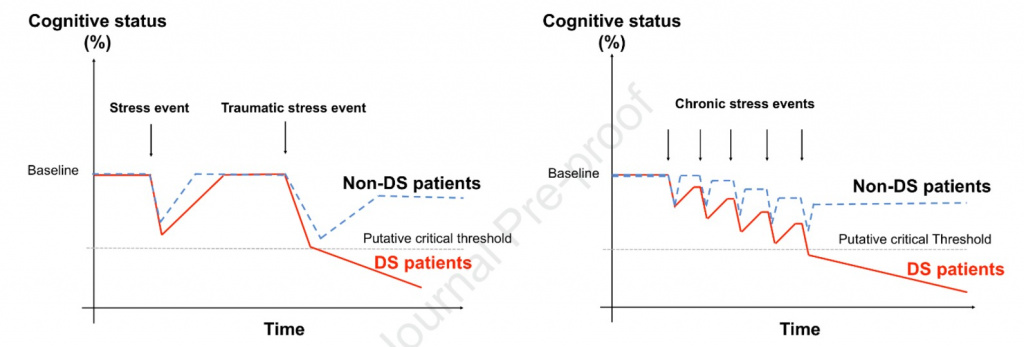Researchers, including clinicians from the Jérôme Le jeune Institute and the University of Chicago, recently published a paper on the possibility of a link between stress and the onset of dementia in patients with Down syndrome (Ds).
Journal citation:
Poumeaud Franç, Mircher C, Smith P, Faye P-A, Sturtz F, Decipheringthe links between psychological stress, depression, and neurocognitive decline in patients with Down syndrome, Neurobiology of Stress (2021), doi: https://doi.org/10.1016/j.ynstr.2021.100305
The researchers noticed that early cognitive decline in persons with Down syndrome often follows a traumatic psychological event. They set out examine the “molecular and cellular events that may, to some extent, explain or support these clinical observations” (P. 3). They concluded that people with Ds may be at a higher risk for developing “stress-induced Alzheimer’s disease (AD).”
The study includes a great deal of information that is important for caregivers of adults with Ds. The following is a summary of that information.
- The way Ds patients react to stress is similar to the way other people react to intense stress (much like post-traumatic stress disorder (PTSD)).
- “People with Ds are more susceptible to depression because of their socio-cognitive disabilities and morphological [biological] differences.” P. 4
- Traumatic psychological stress has been linked to early onset of AD in the general population but the link has not been studied within the Ds population.
- These researchers believe that “stress may be a spark for a decompensation cascade, starting with depression before evolving towards AD” (p.11).
- Acute psychological stress increases cortisol, the “fight-or-flight” hormone, which can alter brain neuroplasticity and induce emotional-cognitive deficiencies.
- People with Ds are “biologically at high risk of developing depressive and anxiety disorders or major depression, but it is harder to diagnose because of communication issues.
- Co-morbid (appearing at the same time as Ds) sleep disorders can affect anxiety and depression.
- Obstructive sleep apnea affects 23% to 78% of patients with DS and can impair working memory and cause atrophy of the hippocampus (The hippocampus is involved in the formation of new memories and is also associated with learning and emotions).
- Behavioral sleep disturbances affect 15% of patients with Ds and significantly increase anxiety, depression, and dementia.
- Fragmented/fractured sleep is a 40% prevalent comorbidity.
- People with cognitive disabilities suffer from low resilience to psychological stress. Low IQ has been found to be a risk factor for developing PTSD after a traumatic event.
- The plaques and tangles that are associated with Ds and AD decrease resilience to psychological stress.
- Thus, it “can be envisioned that Ds is an additional risk factor for poor resilience to the development of AD.” P. 17
- The researchers made two recommendations:
- Avoid stress
- Consider anti-depressants
- May help differentiate between depressive disorders and dementia
- Studies show that consistent use reduces plaques
Figure 1.

The full study is available for free online and I encourage parents and siblings to read the full study and share it with your loved one’s physician, especially if you notice a decline in abilities or suspect that your loved one is depressed.

